
The Sustainable Textiles of the Asian Region (STAR) Network has taken another step in its sustainability journey by becoming a supporting organization of the Fashion Industry Charter for Climate Action, an initiative led by UN Climate Change.
The alliance, which brings together nine national associations representing the garment, footwear, and travel goods industries in Bangladesh, Cambodia, China, Myanmar, Pakistan, and Vietnam, says the move highlights its determination to ensure Asia’s manufacturing voices are central in the global climate conversation. Together, STAR members represent nearly 35,000 manufacturers producing goods worth over US $ 420 billion annually.
The Charter is a collective pledge by leading fashion brands, retailers, suppliers, and industry bodies to align with the Paris Agreement’s goal of limiting global temperature rise to 1.5°C. It calls for bold action, including net-zero emissions by 2050, the promotion of renewable energy, and scaling up of circular business models across the fashion industry.
By joining as a supporting organisation, STAR Network hopes to amplify suppliers’ perspectives and push for practical solutions that help factories navigate the green transition. The partnership is expected to:
Give Asian producers stronger representation in global sustainability discussions, boost collaboration with international brands and industry peers on cutting-edge climate solutions, expand training and technical support for manufacturers adapting to renewable energy and low-carbon practices and support joint projects on sustainable production and transparent supply chains.
Fazlee Shamim Ehsan, Chairman of STAR Network and Executive President of the Bangladesh Knitwear Manufacturers and Exporters Association (BKMEA), described the step as “a major milestone” for Asian suppliers.
“By joining the Charter, we are making sure our voices are heard in shaping the fashion industry’s climate future,” he said. “Our priority is to drive sustainable practices across supply chains, while ensuring the transition remains fair and inclusive for workers and communities.”
Sovichea Saron, who heads the STAR Secretariat, said the commitment showed both ambition and readiness from member associations.
“This milestone is proof of our determination to match global climate goals with local action,” he said. “It strengthens our ability to partner with brands and build real solutions that deliver both resilience and competitiveness for the industry.”
Going forward, STAR Network plans to engage in initiatives under the Charter, including renewable energy programs, capacity-building for suppliers, and collaborative research to shape policies rooted in evidence.
As sustainability takes center stage in global trade, STAR’s new role positions it as a strong regional advocate for manufacturers in Asia. The network says its mission is clear: amplify supplier voices, create inclusive partnerships, and accelerate the shift toward a climate-resilient garment sector that benefits businesses, workers, and communities alike.






